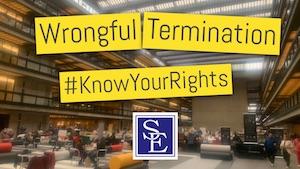OF DISCRIMINATION AND HARASSMENT
Will a Lawyer Take My Employment Case on a Contingency?

Most plaintiff employment lawyers will take cases on a contingency basis. Whether a plaintiff employment lawyers will take an employment case on a contingency basis depends on the strengths and weaknesses of the case and ultimately the chances they believe they can prove the case in a court of law. Employment lawsuits are complex, time-consuming and unpredictable. For a plaintiff employment attorney to agree to take a case on a contingency, they will have to have a strong level of confidence in their ability to succeed in obtaining a recovery.
Most employment lawyers will offer and agree to take a case on an hourly basis so long as the client can pay the attorneys’ hourly rates. However, employment cases are extremely costly and most people cannot afford to pay an employment attorney their hourly rate for the entire course of the lawsuit. Therefore, it is often preferable for an individual to retain an employment attorney on a contingency if able to secure one who is willing to do so.
Hourly fee arrangements are generally straightforward. With hourly fee arrangements, an employment lawyer is paid his or her hourly rate multiplied by the actual time expended by the attorney in litigating the case. It is typically calculated in 6-minute increments. The hourly rates of the attorneys and support staff working on your matter should be spelled out in an executed retainer agreement with the client. Often hourly fee arrangements require an initial retainer fee to be paid by the client to the law firm against which the firm will bill for its time.
Under contingency fee agreements, the law firm will only be paid for their legal services if the client is successful in receiving an award, judgment or settlement. If the client and law firm are unsuccessful, the client is not responsible for paying the law firm for their legal services under a contingency fee arrangement.
Many employment lawyers are willing to take cases on a contingency fee basis because the legal claim(s) being pursued provide that the Court can make an award of attorneys’ fees to the plaintiff’s counsel in the event he or she is a prevailing party. These are referred to as fee-shifting statutes. Fee-shifting statutes make employers responsible for paying the attorneys’ fees of the plaintiff’s employment lawyer when the employee prevails on his or her claims in the employment lawsuit. While most laws do not have fee-shifting components, such as in personal injury, many federal and state employment laws provide for fee-shifting, including the Law Against Discrimination, Family and Medical Leave Act, New Jersey Family Leave Act, New Jersey Equal Pay Act and Wage Payment laws. Fee-shifting statutes help protect employees by allowing equal access to the courts by providing the financial incentive of a fee-award for competent and skilled plaintiff employment lawyers who take important discrimination cases to ensure enforcement of State and Federal laws meant to protect employees.
Under New Jersey law, an employment lawyer can also obtain an enhancement of his or her attorneys’ fees incurred in litigating the employment claim. This means that a Court can award a plaintiff employment lawyer an additional sum above and beyond the hourly rate for time expended in litigating the case. The New Jersey Supreme Court has ruled that higher contingency fee enhancements are appropriate when (1) there is no mechanism for mitigation of the risk of non-payment; (2) no possibility of payment from the client unless they receive an award of attorney fees; or (3) in cases in which the relief sought is primarily not monetary but equitable in nature.
Attorney fee agreements are always subject to attorney ethics rules which require that the law firm’s fee be reasonable given the totality of the circumstances. Prior to formalizing the attorney client relationship, it is important for the client to understand the fee arrangement and all other terms contained in the retainer agreement.





